The Intriguing World of Abstract Art: Unveiling its Psychological Benefits
Abstract art, with its seemingly chaotic and non-representational forms, often leaves viewers puzzled and intrigued. While some may dismiss it as mere splashes of color or random shapes, others find solace, inspiration, and profound psychological benefits in the world of abstract art. In this blog post, we will explore the captivating realm of abstract art and delve into the numerous ways it can positively impact our minds and emotions.
1. Emotion Elicitation
One of the most powerful aspects of abstract art is its ability to evoke emotions. Unlike representational art, which often has a clear narrative or subject, abstract art relies on color, shape, and form to convey emotions. Viewers are encouraged to interpret the artwork based on their own experiences and feelings. This process can be deeply therapeutic, allowing individuals to connect with their emotions on a profound level.
2. Stress Reduction
Stress is an omnipresent part of modern life, and seeking solace in abstract art can be a powerful coping mechanism. Studies have shown that viewing abstract art can reduce stress levels by promoting relaxation and providing a mental escape from the pressures of daily life. The ambiguity of abstract art allows viewers to immerse themselves in a world of creativity and imagination, momentarily detaching from their worries.
3. Enhanced Creativity
Engaging with abstract art can ignite one's creative spark. When we contemplate the unique compositions and color palettes in abstract pieces, we are encouraged to think beyond the ordinary and question conventional boundaries. This newfound perspective often translates into increased creativity in our own lives, whether in artistic pursuits or problem-solving.
4. Self-Reflection
Abstract art invites viewers to reflect on their inner thoughts and emotions. As we attempt to make sense of the abstract, we may discover hidden aspects of our own psyche. This form of introspection can be therapeutic, aiding in personal growth and self-awareness.
5. Freedom of Interpretation
Unlike representational art, abstract art does not impose a singular interpretation. Each viewer can perceive abstract works differently, creating a sense of freedom and individuality in their experience. This openness allows people to find personal meaning and relevance in abstract art, fostering a stronger sense of connection to the artwork.
6. Mindfulness and Presence
Engaging with abstract art can promote mindfulness and presence. When we immerse ourselves in an abstract piece, we become fully engaged in the act of observation, drawing our attention away from distractions and into the present moment. This mindfulness can lead to a greater sense of calm and clarity.
Conclusion
Abstract art is far more than a collection of random shapes and colors; it is a portal to a world of emotions, creativity, and self-discovery. Its psychological benefits are abundant, from stress reduction to enhanced creativity and self-reflection. So, the next time you encounter an abstract artwork, take a moment to immerse yourself in its enigmatic beauty and explore the profound impact it can have on your mind and emotions.

